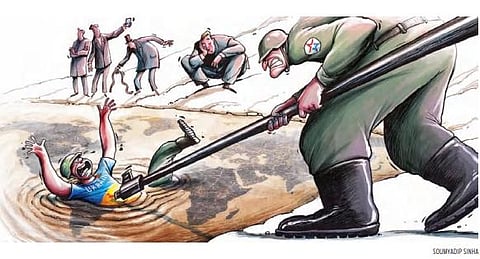

Soon to enter its fourth month, the Russian invasion of Ukraine has made irreversible damages to global norms and order. There were similar occurrences in the past when national and regional developments threatened to weaken the rules-based order. Irrespective of their actual behaviours, great powers at least offered lip service to rules, norms and peaceful resolution of disputes. Not anymore. Diplomacy, soft power and morality are replaced by the re-emergence of raw military power. Only great powers write the international order—but since times immemorial, they have never been accountable for the very laws they formulate. Some justify aggression in the name of international peace and security, and others brandish narrow national interests. Either way, the redlines and punishment mechanisms are always the prerogative of the great powers. And Ukraine is the latest example.
Russia's two-decade-old economic revival has now taken an ominous militant form. Even if the eastward expansion of NATO is an existential threat, the way President Vladimir Putin sought to challenge it is a warning for other great powers and vulnerable smaller countries; great power will continue to rewrite the international order, and weaker ones are condemned to suffer the consequences. This asymmetrical order was not the dream of the Yalta conference, which sought to end the scourge of wars.
Two, the cavalier manner several public figures flag the possibility of World War III, and nuclear confrontation, should dispel any notions of international norms. In the past, only maverick leaders made such statements filled with bravado. One can’t escape this uncomfortable question: Was Ukraine foolish and short-sighted to give up and destroy its nuclear weapons in 1994 and join the Nuclear Non-Proliferation Treaty (NPT) as a non-nuclear-weapon state, just four years before the South Asian tests? Similar questions were raised over North Korea and Iraq. Now the Russian invasion of non-nuclear and helpless Ukraine sends an unmistakable message to hardliners in Iran: giving up the nuclear option or compromising enrichments will be an open invitation for external interventions in the Islamic republic.
Three, the Ukraine crisis underscored individual and collective hypocrisies. Legitimising the Russian invasion has unintended consequences. Saddam Hussein justified his invasion of Kuwait on the grounds of the latter siphoning off Iraqi oil through slant drilling. Now Putin sees NATO expansion as a redline that must not be crossed. Like individuals, nations are also short-sighted; the Crimean crisis of 2014 should have warned the Western strategic community of the Russian capabilities and calculations. Even if the political leaders were indulging in wishful thinking, there should have been plans for the worst-case scenario. Unfortunately, Washington did not do its homework before contemplating the expansion of NATO so close to the Russian heartland.
Four, as the organisation of sovereign states, the UN is not a perfect body. Yet, it has been striving to limit conflicts and move the world towards a more equitable order based on justice. The Ukraine crisis has pushed the UN back by several decades. In 1956, the UNSC was paralysed over the Suez crisis, as Britain and France, the major invaders of Egypt (along with Israel), were permanent members. Hence, the issue moved to the UN General Assembly, which overwhelmingly condemned and isolated the former colonial powers. However, the real force was US President Dwight Eisenhower, who strongarmed and reversed the tripartite aggression. The situation is different today. Backed by China, Russia has paralysed the UNSC, and the UN General Assembly is ineffective without a global hegemon. International condemnation and isolation of Russia make headlines but are not sufficient to influence Putin.
Five, the Ukraine crisis reminds us of the flip sides of leaders with unbridled powers. As the invasion drags on, Russia's lack of pre-war preparation is visible. The invasion was not a well-planned military strategy, and Russian generals were perhaps bullied into submitting to political diktats. If regime change in Ukraine was the goal, the Russian generals are executing it badly. Since the days of Carthage, wars have had one golden rule: you can initiate a war, but you can’t write its end.
Six, popular and intellectual anti-Americanism has paved the way for widespread justification of the Russian invasion. While the crisis has exposed the policy limitations of the US and the West, any move to rationalise the Russian action has one danger. Will the Ukraine crisis be a carte blanche for similar actions by other powers vis-à-vis their hapless neighbours? In short, will Putin be a ‘precedent’ for Chinese President Xi Jinping to enforce his will on Taiwan?
Seven, uncertainties of the final outcome have compelled several countries, including India, to take refuge under political realism and temporarily bury core issues like the inviolability of sovereignty and territorial integrity. Instead, they settle for hedging to minimise the negatives and maximise their gains. Instead, this crisis should be an opportunity to explore and expand policy choices for the future.
With neither side prepared to climb down, an early end to the Ukraine crisis seems elusive. Meanwhile, without a serious political implosion in either country, the world is condemned to endure the political, economic and diplomatic consequences of the crisis and the systematic dismantling of the post-World War II international order.
P R Kumaraswamy
Professor at JNU. Teaches contemporary Middle East there
(kumaraswamy.pr@gmail.com)